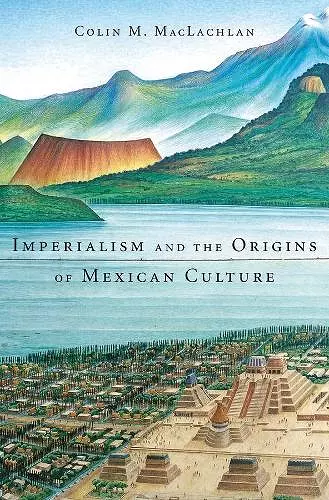Imperialism and the Origins of Mexican Culture
Format:Hardback
Publisher:Harvard University Press
Published:30th Apr '15
Currently unavailable, and unfortunately no date known when it will be back

With an empire stretching across central Mexico, unmatched in military and cultural might, the Aztecs seemed poised on the brink of a golden age in the early sixteenth century. But the arrival of the Spanish changed everything. Imperialism and the Origins of Mexican Culture chronicles this violent clash of two empires and shows how modern Mestizo culture evolved over the centuries as a synthesis of Old and New World civilizations.
Colin MacLachlan begins by tracing Spain and Mesoamerica’s parallel trajectories from tribal enclaves to complex feudal societies. When the Spanish laid siege to Tenochtitlán and destroyed it in 1521, the Aztecs could only interpret this catastrophe in cosmic terms. With their gods discredited and their population ravaged by epidemics, they succumbed quickly to Spanish control—which meant submitting to Christianity. Spain had just emerged from its centuries-long struggle against the Moors, and zealous Christianity was central to its imperial vision. But Spain’s conquistadors far outnumbered its missionaries, and the Church’s decision to exclude Indian converts from priesthood proved shortsighted. Native religious practices persisted, and a richly blended culture—part Indian, part Christian—began to emerge.
The religious void left in the wake of Spain’s conquests had enduring consequences. MacLachlan’s careful analysis explains why Mexico is culturally a Mestizo country while ethnically Indian, and why modern Mexicans remain largely orphaned from their indigenous heritage—the adopted children of European history.
MacLachlan argues that the creation of modern Mexican culture was a result of the clash of two imperialisms, Indo-Mexico and Spain’s conquest of the New World, that were on similar historical trajectories, though evolving at a different rate…The book provides a historical overview of the development of both empires, covering the imperial maturation of Indo-Mexico up to the Aztec Confederation and the expansion of Spain to the point of becoming an imperial power…Absorbing and well-documented. -- Michael C. Miller * Library Journal *
MacLachlan has written a very ambitious book, tracing the parallel yet distinct imperial trajectories of Spain in the Old World and Indo-Mexico in the New World. This is clearly the work of a scholar who has spent a lifetime studying Spain’s imperial expansion in the Americas as well as Mexico’s pre-Columbian and colonial societies. MacLachlan’s erudition is on display in this expansive work of interpretation. -- Andrés Reséndez, author of A Land So Strange: The Epic Journey of Cabeza de Vaca
In this unique work, MacLachlan examines four civilizations—Rome, Islam, Spain, and what he calls Indo-Mexico—to explain the formation of Mexican culture. Such an extraordinary interpretation could only come from an experienced and mature historian who has gained the broad knowledge and understanding necessary to bring together the evolution of the civilizations that intermingled to form Mexican culture. This complex study is well conceived, well researched, and clearly written. -- Jaime Rodríguez, author of We Are Now the True Spaniards: Sovereignty, Revolution, Independence, and the Emergence of the Federal Republic of Mexico, 1808–1824
- Nominated for Friedrich Katz Prize 2016
- Nominated for James A. Rawley Prize in Atlantic History 2016
- Nominated for Jerry Bentley Prize 2016
- Nominated for Bolton-Johnson Prize 2016
ISBN: 9780674967632
Dimensions: unknown
Weight: unknown
352 pages